 The Lysander Spooner Reader by Lysander Spooner
The Lysander Spooner Reader by Lysander SpoonerMy rating: 5 of 5 stars
The first few essays may be too anarchic for most people, but no one should miss "Trial by Jury," though some readers may mistake it for another kind of anarchism. Therein he makes the case that a jury must have the right to judge laws as much as the facts of a case. He traces this tradition to the Magna Carta and even earlier to Saxon times before William the Conqueror. And considering that the people's representatives, the senate, the executive, and judges do have such a right he asserts that "there is no more absurdity in giving a jury a veto upon the laws, then there is in giving a veto to each of these other tribunals." He cites the legal historian Crabbe as pointing out that juries were in fact called judges in the 12th century. And also another historian, Millar, "jurymen were, in reality, judges." The English monarchs and government were never very happy about this common law power of juries but nonetheless were forced to reaffirm the oath taken by King John in the Magna Carta about 30 times over the centuries, depending on the count. It seems the historical roots of the power of juries, the "palladium of liberty" was chipped away partly because the older laws were written in French or Latin, making it hard for ordinary people to cite them in defense of the power of juries. Quoting Mackintosh, "the first Act of the House of Commons composed and recorded in the English tongue" was only in 1415.
Spooner establishes the power that juries had in Anglo-Saxon times and later after the Magna Carta, writing that "the jury were to judge of everything involved in the trial; that is, they were to judge of the nature of the offence, of the admissibility and weight of testimony, and of everything else whatsoever that was of the essence of the trial. If anything whatever could be dictated to them, either of law or evidence, the sentence would not be theirs, but would be dictated to them by the power that dictated to them the law or evidence. The trial and sentence, then, were wholly in the hands of the jury." In the historical documents, jurors were referred to as peers (of the same neighborhood as the accused), twelve free and legal men, or twelve knights and in many other ways besides.
Besides relying on tradition, Spooner also points out that 12 jurors chosen by lot (not carefully screened as they are today) are much less all likely to be corruptible than is one bad judge. As if we needed evidence, he does give lots of depressing, yet amusing, examples of corrupt judges, many of which come from Hume's History of England, Appendix 2.
Perhaps surprisingly, Spooner points out that jury trials were also recognized on the continent in "Gothic" nations, Germany, as well as Scotland. Spooner's view of a proper court is as a non-technical "court of conscience" which would not require elaborate studies on the part of juries to perform their duties. Such courts would rely on natural law to render justice, which is in fact the title of the first essay in the Spooner Reader. Nowadays the idea of jurors judging the law seems outlandish to most Americans as well as others, but there is a movement afoot to return this power to American juries which is known as jury nullification. The logic of giving juries all the power of assessing a case is simply put thus by Spooner: "How is it possible that juries can do anything to protect the liberties of the people against the government; if they are not allowed to determine what those liberties are"? That is, they must be able to pass judgement on laws themselves.
View all my reviews


No comments:
Post a Comment